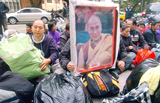Tibetan refugees yesterday threatened to stage another sit-in if the Mongolian and Tibetan Affairs Commission (MTAC) refused to grant them residency permits as promised.
Tibetan Welfare Association chairman Jamga (蔣卡) said that although the government had promised to give his compatriots legal residency status, it was now tightening application criteria, making it difficult for them to obtain permits.
“We were overjoyed when the Immigration Act [入出國及移民法)] was amended before the Lunar New Year, making it possible for us to get permits, and President Ma Ying-jeou [馬英九] also said that he cared about us and would help us,” Jamga told reporters.

PHOTO: CHANG CHIA-MING, TAIPEI TIMES
“However, after several explanatory meetings, more and more of us have been disqualified from obtaining permits for various reasons. We don’t know how many people will be granted residency in the end and feel cheated by the government,” he said.
Over 100 Tibetan refugees without legal status staged a sit-in demonstration at Liberty Square last December, asking the government to grant them asylum. The demonstration ended when the refugees received temporary residency permits in January.
Many of the Tibetan refugees crossed through the Himalayas to Nepal and India before arriving in Taiwan using forged Nepalese or Indian passports.
The amended law stipulates that the refugees must provide legal documents to prove their identity as Tibetans, Jamga said.
The document can be either the applicant’s birth certificate (or that of his/her parents), passport, Indian Identity Certificate (IC, issued by the Indian government to stateless refugees) or their Independent Book (commonly known as the Green Book, a document proving they pay taxes to the Tibetan government in exile in India), Jamga said.
“But while constantly moving, many of us have lost our documents or never had such documents [to begin with],” he said.
In addition, Jamga said that while National Immigration Agency (NIA) officials had told them in their first meeting that holders of Indian ICs would get priority, in the third meeting officials said those whose Indian ICs were still valid would be repatriated to India immediately.
“This terrifies us; if we are sent back, we may face imprisonment or even execution,” he said.
Even without being repatriated, without legal residency the refugees have no right to work, said Awansangdan, another Tibetan.
“We are now having difficulty buying food and paying rent. We have relied on donations from our Taiwanese friends, but we are at the end of our resources. We are pleading for the government to give us residency,” he said.
In response, MTAC Secretary-General Chien Shih-yin (錢世英) said that the priority was to help the refugees stay in Taiwan legally, but it would take time.
“The commission has employed very loose criteria for residency application ... I understand that [the refugees] have been through a lot, but the commission wants them to attain residency status legally so they must provide something [as opposed to verbal promises] to prove their identities,” Chien said.
Commission staffers have been working overtime since the Lunar New Year to help the refugees, Chien said, but the whole process will take a few months.
“There will be no immediate repatriations,” Chien said. “There may have been misunderstandings between the refugees and frontline staff.”

Taiwanese can file complaints with the Tourism Administration to report travel agencies if their activities caused termination of a person’s citizenship, Mainland Affairs Council Minister Chiu Chui-cheng (邱垂正) said yesterday, after a podcaster highlighted a case in which a person’s citizenship was canceled for receiving a single-use Chinese passport to enter Russia. The council is aware of incidents in which people who signed up through Chinese travel agencies for tours of Russia were told they could obtain Russian visas and fast-track border clearance, Chiu told reporters on the sidelines of an event in Taipei. However, the travel agencies actually applied

New measures aimed at making Taiwan more attractive to foreign professionals came into effect this month, the National Development Council said yesterday. Among the changes, international students at Taiwanese universities would be able to work in Taiwan without a work permit in the two years after they graduate, explainer materials provided by the council said. In addition, foreign nationals who graduated from one of the world’s top 200 universities within the past five years can also apply for a two-year open work permit. Previously, those graduates would have needed to apply for a work permit using point-based criteria or have a Taiwanese company

The Shilin District Prosecutors’ Office yesterday indicted two Taiwanese and issued a wanted notice for Pete Liu (劉作虎), founder of Shenzhen-based smartphone manufacturer OnePlus Technology Co (萬普拉斯科技), for allegedly contravening the Act Governing Relations Between the People of the Taiwan Area and the Mainland Area (臺灣地區與大陸地區人民關係條例) by poaching 70 engineers in Taiwan. Liu allegedly traveled to Taiwan at the end of 2014 and met with a Taiwanese man surnamed Lin (林) to discuss establishing a mobile software research and development (R&D) team in Taiwan, prosecutors said. Without approval from the government, Lin, following Liu’s instructions, recruited more than 70 software

Chinese spouse and influencer Guan Guan’s (關關) residency permit has been revoked for repeatedly posting pro-China videos that threaten national security, the National Immigration Agency confirmed today. Guan Guan has said many controversial statements in her videos posted to Douyin (抖音), including “the red flag will soon be painted all over Taiwan” and “Taiwan is an inseparable part of China,” and expressing hope for expedited reunification. The agency last year received multiple reports alleging that Guan Guan had advocated for armed reunification. After verifying the reports, the agency last month issued a notice requiring her to appear and explain her actions. Guan